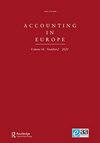The Role of Existing Regulation and Discretion in Harmonising Non-Financial Disclosure
IF 4.3
Q1 BUSINESS, FINANCE
引用次数: 41
Abstract
Abstract The 2014/95/EU Directive is the first regulatory attempt to harmonise large entities’ non-financial reporting. It sets minimum requirements whilst leaving discretion to Member States in transposing relevant aspects of disclosure. The transposition is the first moment in which the Directive directly impacts on companies and determines whether they will be complying with more similar rules. This study uses the fit/misfit theory to assess the achievement of formal harmonisation between the UK, France and Italy. An analysis of domestic regulations shows that discretion favoured convergence of rules but also the presence of old and new differences. All countries had to engage in some degree of change to be compliant. The UK and France had a high degree of legal fit and used discretion to limit adaptation costs by minimising the legal intervention and over-implementing the Directive respectively. Italy instead welcomed the legal misfit and greatly departed from its previous regulation.现行法规和自由裁量权在协调非财务信息披露中的作用
2014/95/EU指令是第一个协调大型实体非财务报告的监管尝试。它规定了最低要求,同时让会员国自行决定如何改变披露的有关方面。这是该指令第一次对公司产生直接影响,并决定他们是否将遵守更多类似的规则。本研究使用适合/不适合理论来评估英国、法国和意大利之间正式协调的成就。对国内法规的分析表明,自由裁量权有利于规则的趋同,但也有利于新旧差异的存在。所有国家都必须进行某种程度的变革,以符合要求。英国和法国具有高度的法律契合度,并分别通过最小化法律干预和过度实施指令来使用自由裁量权来限制适应成本。相反,意大利对这种法律上的不适应表示欢迎,并大大偏离了之前的规定。
本文章由计算机程序翻译,如有差异,请以英文原文为准。
求助全文
约1分钟内获得全文
求助全文

 求助内容:
求助内容: 应助结果提醒方式:
应助结果提醒方式:


